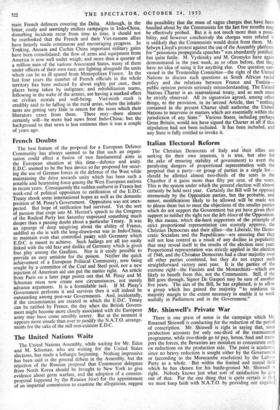The United Nations Waits
The United Nations Assembly, while waiting for Mr. Eden and M. Schuman, who are waiting for the United States elections, has made a lethargic beginning. Nothing impressive has been said in the general debate in the Assembly, but the rejection of the Russian proposal that Communist delegates from North Korea should be brought to New York to give evidence about germ warfare, and the adoption of a counter- proposal (opposed by the Russian bloc) for the appointment of an impartial commission to examine the allegations, suggest the possibility that the mass of vague-charges that have been bandied about by the Communists for the last few months may be effectively probed. But it is not much more than a possi- bility, and however conclusively the charges were refuted it is unlikely that the Communists would desist from them. Mr. ' Selwyn Lloyd's protest against the use of the Assembly platform for " poisonous propaganda speeches" was abimdantly justified, but quite futile: M. 'Vyshinsky and M. Gromyko have again demonstrated in the past week, as so often before, that they have no idea of using it for anything else. One question can- vassed in the Trusteeship Committee—the right of the United Nations to discuss such questions as South African racial policy and _the relations between France and Tunisia— public Opinion persists seriously misunderstanding. The United Nations Charter is an international treaty, and as such must be strictly observed. All its signatories agreed, among other things, to the provision, in its 'second Article, that " nothing contained in the present Charter shall authorise the United.
Nations- to intervene in matters which are essentially within the jurisdiction of. any State." Various States, including perhaps Great Britain, mould not have signed the Charter at all if that stipulation had not been included. It has been included, and any State is fully entitled to invoke it.


































 Previous page
Previous page